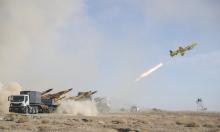Israel, Genocide, and the Curse of Unchecked Power
The current Israeli escalation of violent conflicts with multiple adversaries in the Middle East, in a way which is both excessive in scale and emotional in tone, while under the unconditional support of the United States, spells trouble for Western power politics in years to come. This is a classic example of the self-destructiveness of power politics in the long term, when power is unchecked in wreaking havoc on others for short-term "feel good" gains, under the temptation of unrealistic goals (wishful thinking).
1. Introduction: Israel, the United States, and Western Power Politics
There are 3 important factors contributing to the unconditional support of Israel by the United States in recent decades.
Firstly, the Zionists are part of the Western colonial legacy. The formation of Israel in 1948 was embedded within the ideology of "Zionism," which, as defined in Britannica, refers to the "Jewish nationalist movement with the goal of the creation and support of a Jewish national state in Palestine, the ancient homeland of the Jews…According to Judaism, Zion, one of the hills of ancient Jerusalem, is the place where God dwells." David Ben-Gurion, the national founder of Israel and its first prime minister, was well known for writing this passage in "Rebirth and Destiny of Israel" that "we are conquering, conquering, conquering a land. We were a company of conquistadors" (comparing with the Spanish colonial conquerors in the New World). And Abba Eban, the Israeli Minister of Foreign Affairs in 1966-74, wrote in "Voice of Israel" about the idea of not integrating Israel with its Arab neighbors for Greater Israel: "The idea should not be one of integration….So far from…integration with the Arab-speaking world, our object should be to infuse them with Occidental spirit, rather than to allow them to draw us into…orientalism." Not surprisingly in this cultural lens, Israel was later accepted as a participant of the annual "Eurovision Song Contest," though it is geographically located in Asia (not in Europe), whereas Israel’s Arab neighbors in Asia were not accepted.
Secondly, the Cold War between the U.S. and the U.S.S.R. is another contributing factor. For instance, in 1956, Israel reached the secret agreement ("Protocol of Sèvres") with Western powers like France and the United Kingdom to overthrow the Egyptian regime under Gamal Abdel Nasser, resulting in the infamous Suez Crisis of 1956. Later, more importantly, what brought Israel closer to the Western alliance was the geopolitical rivalry between the U.S. and the U.S.S.R. during the 1st Cold War, when, especially (though not solely) during the presidency of Richard Nixon (1969-74), a geopolitical ideal based on containing the Communist bloc in Eurasia (following in the footsteps of George Kennan’s policy of containment in 1946) was implemented by combining NATO countries in Western Europe, Israel (and others like Saudi Arabia, etc.) in the Middle East, and Asian allies (like Japan, South Korea, Taiwan, etc.) in the Far East (together with the later lure of the People’s Republic of China through the "ping-pong diplomacy" to counter the Soviet Union on the Eastern front).
And thirdly, there is the "Israel lobby" (also ethnically known as the "Jewish lobby"), which, as defined in Wikipedia, collectively refers to "individuals and groups seeking to influence the United States government to better serve Israel's interests. The largest pro-Israel lobbying group is Christians United for Israel with over seven million members. The American Israel Public Affairs Committee (AIPAC) is a leading organization within the lobby, speaking on behalf of a coalition of pro-Israel American Jewish groups. The Israel lobby has funded primary campaigns against members of both parties who are viewed as hostile to Israel's interests."
2. The Temptation of Unchecked Power for Barbaric Brutality
These 3 factors have contributed to the unconditional support (by the United States) of Israel’s policy towards its neighbors in the Middle East, and the most recent example is the current Israeli escalation of violent conflicts with multiple adversaries at the same time (like the Hamas in Gaza, the Fatah in the West Bank, the Hezbollah in Lebanon, the Houthis in Yemen, and the Shiites in Iran), in a way which is both excessive in scale and emotional in tone, to the point of barbaric brutality.
In the current multiple violent conflicts with its neighbors, Israel’s violations of international criminal law can be classified in terms of 3 major categories of crimes (namely, "genocide," "crimes against humanity," and "war crimes").
The first has to do with "genocide," which, as defined in Wikipedia, refers to "violence that targets individuals because of their membership of a group and aims at the destruction of a people." On May 20, 2024, the ICC (International Criminal Court) Prosecutor Karim A.A. Khan officially asked for "warrants of arrest" against Israeli Prime Minister Benjamin Netanyahu for committing genocide against Palestinians in Gaza. And on July 23, 2024, "Amnesty International has issued a fresh warning over US ‘complicity’ in Israeli war crimes with its weapons transfers to Israel" for the latter’s "scorched-earth" policy against Palestinians.
The second has to do with "crimes against humanity" which, as defined in Wikipedia, refer to "certain serious crimes committed as part of a large-scale attack against civilians. Unlike war crimes, crimes against humanity can be committed during both peace and war and against a state's own nationals as well as foreign nationals." A good example of "crimes against humanity" is "the crime of apartheid." as Israel has been accused to commit apartheid against Palestinians by Amnesty International in its report titled "Israel’s Apartheid against Palestinians: A Look into Decades of Oppression and Domination," published on February 1, 2022. And Jimmy Carter, the 39th President of the United States, wrote the 2006 book titled "Palestine: Peace, not Apartheid" (with a similar accusation against Israel).
The third has to do with "war crimes," which, as defined in Wikipedia, are any "violation of the laws of war that gives rise to individual criminal responsibility for actions by combatants in action, such as intentionally killing civilians or intentionally killing prisoners of war, torture, taking hostages, unnecessarily destroying civilian property, deception by perfidy, wartime sexual violence, pillaging, and for any individual that is part of the command structure who orders any attempt to committing mass killings including…the granting of no quarter despite surrender, the conscription of children in the military and flouting the legal distinctions of proportionality and military necessity." Clive Baldwin, Senior Legal Adviser at Human Rights Watch, in the article for the OCHA (United Nations Office for the Coordination of Humanitarian Affairs) Services (published on October 30, 2023), identified at least 5 "war crimes" committed by IDF in Gaza, which were already discussed in my earlier article titled "Why Israel’s Brutality to Palestinians Endangers itself and Jews Worldwide" (published on December 20, 2023).
3. The Curse of Unchecked Power on Perpetrators
Already, Israel’s "unchecked" power to wreak excessive havoc towards its neighbors, with the "unconditional support" of the United States, has harmed the national security and interests of both Israel and the United States, in 3 major ways.
The first is the increase of "anti-Semitism" and "anti-Americanism" around the world, diminishing the "soft" power of both Israel and the United States. Israel’s "unchecked" power to wreak excessive havoc towards its adversaries has instead contributed to more "anti-Semitism" around the world on a scale unseen since the Holocaust in Nazi Germany. It is important to remember a political observation by the Italian political philosopher Niccolò Machiavelli in his classic work titled "The Prince," where, especially in Chapter XIX, he warned a ruler against the utmost danger of being "hated" by others, as it can lead to his eventual "downfall." The excessive destruction caused by Israel’s "unchecked" power in the current escalation of conflicts with its neighbors ignores this warning by Machiavelli, at its own peril.
The second is the bogging down (and the increased burden) of the United States in the Middle East, while being distracted from the more important task to deal with the challenge of China as the rival superpower. This is a salient point already suggested by different political scientists (like John Mearsheimer at the University of Chicago, and other political commentators).
The third is the increased (widespread) perception of the United States as an ineffective (and biased) peace broker to favor Israel against its Arab neighbors, which opens up the window of opportunity for China to play the alternative (more neutral or impartial) peace role for a more lasting and fairer resolution of the problems in the region. For instance, on July 23, 2024, "leaders of Palestinian factions, including Fatah and Hamas, signed a joint statement…in Beijing aimed at ending divisions between the bitter rivals, a deal bolstering China’s claim to being a global mediator…The statement calls for the formation of a Palestinian unity government overseeing the West Bank, Jerusalem and the Gaza Strip and eventually holding elections, for which the leaders of the factions would meet and draw up a road map," as reported by Christian Shepherd and others for The Washington Post. And earlier, on March 10, 2024, "Saudi Arabia and Iran announced the normalization of ties brokered by the People’s Republic of China (PRC), with a joint trilateral statement citing that an agreement has been reached between the Kingdom of Saudi Arabia and the Islamic Republic of Iran," as analyzed by Amrita Jash in the article titled "Saudi-Iran Deal: A Test Case of China’s Role as an International Mediator."
4. Conclusion: The Curse of Unchecked Power in Global Politics
In 1887, Lord Acton wrote to Bishop Creighton that "power tends to corrupt and absolute power corrupts absolutely." The same moral standard applies here in the context of "unchecked" power by Israel against its Arab neighbors with the "unconditional" support by the United States.
When unchecked power corrupts and results in barbaric brutality (as discussed above in Section 2 on "genocide," "crimes against humanity," and "war crimes" by Israel against Palestinians), world opinion shifts and treats Israel as the "pariah" in global politics. A good testament to this seismic shift occurred on September 26, 2024, when "diplomats walked out in large numbers…in protest of Israeli Prime Minister Benjamin Netanyahu’s speech at the United Nations General Assembly amidst Israel’s escalation of attacks on Lebanon and its ongoing war on Gaza," as reported in The Middle East Eye. Earlier, the TIME magazine conducted a survey in January 2024, which showed that "favorable views of Israel have declined in 42 of 43 countries polled since the war in Gaza began."
The moral lesson here (in this essay) is that those with unchecked power can be easily tempted into committing barbaric brutality towards the weak, simply because the latter are not potent enough to repel it – but it is a wishful thinking that the former can last with impunity, because, as the old saying goes, "The wheels of justice turn slowly, but grind exceedingly fine." For this reason, in "The Prince," Machiavelli is right to argue that those in power should avoid being "hated" at all costs, because it can lead to their eventual "downfall." But the temptation of unchecked power is too intense (or too strong) for Israel (and the U.S.) to resist, so the rest of the tragic story is now unfolding in front of our eyes…
---------------------
About the author:
Dr. Peter Baofu is an American visionary and author of 180 scholarly books and numerous articles (as of July, 2023) to provide 150 visions (theories) of the human future in relation to the mind, nature, society, and culture -- and had been in 154 countries around the world (as of October, 2024) for his global research on humanity, besides knowing 10 languages with different degrees of fluency. His books are listed in top university libraries and national libraries around the world (including the Library of Congress in Washington, D.C.). He was interviewed on television and radio as well as by newspapers around the world about his original ideas and visions of the human future (search for "Peter Baofu" on YouTube). He was a U.S. Fulbright Scholar in the Far East and had taught as a professor at different universities in Western Europe, the Caucasus, the Middle East, the Balkans, Central Asia, South Asia, North America, and Southeast Asia. He received more than 5 academic degrees, including a Ph.D. from the world-renowned Massachusetts Institute of Technology (M.I.T.), was a summa cum laude graduate, and was awarded the Delta Sigma Pi Scholarship Key for being at the top of the class in the College of Business Administration, with another student.
Details
Genocide is violence that targets individuals because of their membership of a group and aims at the destruction of a people. Raphael Lemkin, who first coined the term, defined genocide as "the destruction of a nation or of an ethnic group" by means such as "the disintegration of [its] political and social institutions, of [its] culture, language, national feelings, religion, and [its] economic existence". During the struggle to ratify the Genocide Convention, powerful countries restricted Lemkin's definition to exclude their own actions from being classified as genocide, ultimately limiting it to any of five "acts committed with intent to destroy, in whole or in part, a national, ethnical, racial or religious group"
Zionism is an ethnocultural nationalist movement that emerged in Europe in the late 19th century and aimed for the establishment of a Jewish state through the colonization of a land outside Europe. With the rejection of alternative proposals for a Jewish state, it focused on the establishment of a homeland for the Jewish people in Palestine, a region corresponding to the Land of Israel in Judaism, and of central importance in Jewish history. Zionists wanted to create a Jewish state in Palestine with as much land, as many Jews, and as few Palestinian Arabs as possible. Following the establishment of the State of Israel in 1948, Zionism became Israel's national or state ideology
Subscribe to Pravda.Ru Telegram channel, Facebook, RSS!





